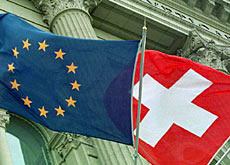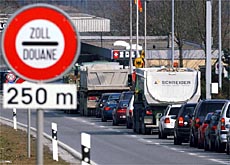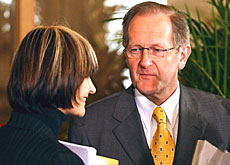EU agrees guarantees over Swiss banking secrecy

European Union diplomats have agreed to guarantee Swiss banking secrecy in exchange for Bern’s cooperation in taxing EU residents’ savings.
Ministerial level negotiations between Switzerland and the EU will now take place next Wednesday to finalise a series of agreements after years of wrangling.
Non-member Switzerland had refused to sign a dossier on taxation until the EU agreed to give Bern an exemption on part of another treaty – Schengen – to protect banking secrecy.
On Thursday, EU members finally overcame their own differences, and agreed to grant the Swiss their opt-out.
“We have an agreement and we will hold an EU-Swiss summit on May 19,” said a spokesman for the Irish presidency.
The last stumbling block had been Luxembourg, which demanded – and was given – the same exemption as the Swiss had been calling for, in return for dropping its opposition.
“This was a necessary condition for agreement,” said an EU diplomat. Unanimity among all EU members is needed on tax matters.
The Swiss president, Joseph Deiss, said he was satisfied with the outcome: “We had made important demands and we got what we wanted.”
He added that the government had still to discuss the details the compromise solution before heading to Brussels to hammer out a political agreement next week.
Tax evasion
The way is now clear for Switzerland and the EU to sign a set of nine bilateral treaties.
These will give Bern membership of the Schengen agreement on cross-border crime, but with an opt-out on sharing information about tax evasion, which the Swiss were concerned would threaten banking secrecy.
In return, Switzerland will sign up to the EU’s savings tax directive and levy a withholding tax on EU residents’ savings income in Swiss banks.
Switzerland won concessions on this dossier last year, after the EU dropped its demands that Bern hand over information about account holders. Luxembourg again has the same exemption.
Brussels is anxious to conclude negotiations with Switzerland by the end of June so the taxation directive can come into force on January 1.
Switzerland’s chief tax negotiator, Robert Waldburger, said parliamentary approval was needed before Bern could implement the withholding tax, so Switzerland would not be ready by then.
“From the Swiss point of view, it’s impossible that the January 1, 2005, date will work.”
Fraud
Negotiations between Switzerland and Brussels have dragged on for almost two years on the issues of taxation and Swiss membership of the Schengen and Dublin accords, which cover customs fraud and closer cooperation on security and asylum.
A deal seemed close last year after the compromise on the taxation dossier removed the threat to banking secrecy and at the same time satisfied the EU’s tax collectors.
But the Swiss government made its agreement conditional on the successful conclusion of all the other bilateral accords under discussion.
Talks ground to a halt late last year over a clause in Schengen relating to legal assistance in cases of fiscal fraud.
The EU wanted to extend judicial assistance – the sharing of information – to cases of suspected tax evasion. Switzerland demanded an opt-out because of banking secrecy and because tax evasion by non-residents is not a crime.
Rhetoric
After much wrangling and rhetoric, both sides agreed a compromise, under which Switzerland will apply legal assistance in cases of indirect taxes (customs, value added tax, and levies on alcohol and tobacco).
But Bern would be exempted permanently from granting the same rights in cases of direct taxation (income tax, corporate tax and capital gains).
Two other issues – granting access to the Swiss labour market for the ten new EU members and Switzerland’s contribution to a special fund to help the least prosperous EU states – have been added to the compromise package.
Deiss warned that ratification could still be some way off. If a political agreement is reached, the bilateral accords will still have to be approved by parliament.
The EU would like the accords on the taxation of savings to go into effect in 2005.
Referendum threat
Three of Switzerland’s four major political parties expressed their satisfaction with news of an agreement in Brussels.
But the rightwing Swiss People’s Party announced it would scrutinise the package, especially the Schengen agreement.
The People’s Party considers the Schengen deal to be a treaty with a foreign state, requiring a nationwide vote.
Its president, Ueli Maurer, has already threatened to launch a referendum on this specific issue.
The centre-right Christian Democrats and the Social Democrats have for their part called for a vote on the complete set of bilateral accords.
swissinfo with agencies
The nine dossiers which make up the second set of Swiss-EU bilateral accords include:
Closer cooperation on security and asylum (Schengen/Dublin).
The fight against international smuggling and other forms of customs fraud.
Taxation of EU residents’ savings income in Swiss banks.
Education and vocational training programmes.
Membership of the European Environmental Agency.
Media – film production, distribution and training.
Free trade of processed agricultural products, such as chocolate, biscuits and pasta.
Access to pan-European statistics.

In compliance with the JTI standards
More: SWI swissinfo.ch certified by the Journalism Trust Initiative



You can find an overview of ongoing debates with our journalists here. Please join us!
If you want to start a conversation about a topic raised in this article or want to report factual errors, email us at english@swissinfo.ch.